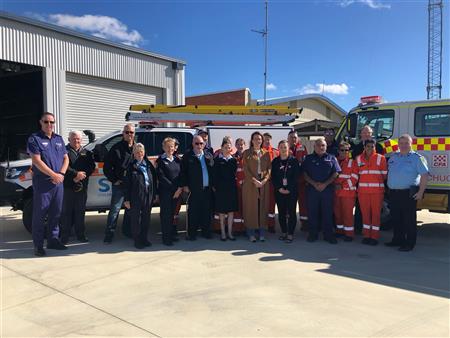The AFP is today releasing a glossary of acronyms and emojis that can be used by child predators who engage in sexualised communication online and via text message.
The glossary has been developed from information contained in investigations and reports undertaken by the AFP-led Australian Centre to Counter Child Exploitation (ACCCE) and AFP child protection teams across Australia.
Many students are receiving their own tablets and mobile phones for the first time ahead of their return to school, and some may start receiving unsolicited text messages or emails.
This resource has been produced to help educate parents and carers about the tactics of child sexual predators, some of whom use acronyms or language to escape adult detection or pretend to be a young person to encourage communication.
Young people can be coerced by adults or peers to take naked pictures of themselves, and send those images via email or text. These images are hard to contain once transmitted and the damage and stigma caused can be life-long.
There is a growing trend of self-produced child exploitation material. These images, which are often being posted online without the knowledge or permission of the victim, are also being identified in the child abuse material held by child sex offenders.
Parents and carers know best when it comes to determining what content is appropriate when educating their children about social media and online child exploitation. While the glossary may provide insight for parents and carers, it also enables parents to ask their children to let them know if they are receiving certain terms or emojis in an email or text.
This glossary adds to the other wealth of information available for parents and carers at the ThinkUKnow program, an AFP-led education program designed to prevent online child sexual exploitation: www.thinkuknow.org.au
AFP Commander for the ACCCE Hilda Sirec said parents and careers could consider the glossary and ThinkUKnow content, and then tailor-make an online safety conversation suitable for their children.
Commander Sirec said online investigators regularly saw cases of child sex offenders exploiting their knowledge of hidden meanings in their attempts to groom children.
She said the glossary was not a definite or exhaustive list of terms, and some terms could mean different things. These terms and inappropriate use of emojis are not condoned by the AFP.
“Predators have schooled themselves in the language of emojis, emoticons and acronyms in order to groom their victims and the AFP is urging all parents and carers to familiarise themselves with this glossary,” Commander Sirec said.
“Understanding how to interpret the messages your children are sending or receiving, such as “NP4NP” which can mean “nude pic for nude pic” or a bowl of noodles emoji, which can represent “nude pictures”, could provide a critical clue that a child is at risk of being groomed or engaging in risky behaviour that could put them in harm’s way.
“Some terms, slang or emojis may seem to be innocent symbols, however, they may signal a highly-sexualised conversation.
“When these emojis or acronyms are being sent from predators, they are an extremely dangerous grooming weapon that can lead to children being coerced into self-producing child abuse material or to set up a face-to-face meeting.
“We really need parents to explain to their children that people online are not always who they claim to be.”
Commander Sirec said the AFP, state and territory law enforcement and key Commonwealth partners were committed to giving parents relevant information to help keep their children safe online.
She said the return to school was the perfect time for parents to have a conversation with their children about their online communication.
“We know that many young children received new devices for Christmas and will also be spending time a lot of time studying online when the school year starts.
“The start of the school year provides the perfect opportunity for parents to talk with their children about safe ways to use their devices.
“We encourage all parents to consider creating a Family Online Safety Contract with their children to reinforce the message that you are there for them anytime they see or hear anything online that makes them feel unsafe or worried.”
The contract has been developed by the ThinkUKnow program. During the past financial year, ThinkUKnow delivered presentations to more than 198,000 students and about 1460 parents, carers and educators.
The ThinkUKnow Corporate Report 2020-21 details the achievements of the program over the past financial year, including presentations delivered highlighting the demand and need for online child safety education throughout the pandemic.
Glossary of emojis, emoticons and acronyms
Please note, this glossary does not provide a definitive dictionary of internet terms as many emojis and some acronyms have multiple meanings. The AFP does not condone or offer verification for the meanings of these emojis and acronyms, but this glossary is rather provided as general education guide for parents
Acronyms and internet slang
Catch a case – Willingness to being arrested and charged for something, often used in relation to sexual desire for someone who is much younger/under age.
CD9 or Code 9 – Parents are around.
DNI – Do not interact, especially as a warning of explicit/sexual content for under 18s.
DM;HS – Doesn’t matter; had sex.
DPW – D*** pictures welcome.
Down in the DM – Using private messages (DM=Direct Message) on social media to ask for nude photos and/or to filter through people to find a sexual encounter.
GNRN – Get Naked Right Now.
GNOC – Get Naked On Camera.
LMIRL – Let’s meet in real life.
LMP – Like my pic.
NIFOC – Naked in front of computer.
NP4NP – Naked Pic For Naked Pic.
P911 – Parent Alert.
PIR – Parent in room.
POS – Parent Over Shoulder.
POV – Point of view, and often indicates that a video is supposed to be filmed as if you’re seeing through someone else’s eyes.
Rule 34 – Any topic can be made into pornographic content.
Snacc/Snack – A person you find attractive.
Sneaky Link – Seeing someone for sex but you want to keep the relationship quiet.
Smash – To have casual sex.
TDTM – Talk dirty to me.
1174 – Nude club.
143 – I love you.
9 – Parent watching.
Emojis and their potential meanings
– Porn (rhymes with corn), can be used to get around word restrictions on social media
– Bottom
– Feeling frisky or naughty
– Desiring someone sexually (often used in response to nudes)
– Nudes, which are often called “noods”
– Used when sending or receiving nudes
– Sexual activity
– Spiciness eg inappropriate or risqué content
-Cuddles
-Drunkenness, sexual arousal, or a grimace
This is not an exhaustive list of what may come across children’s devices. For more advice on this guide or information about online grooming, go to ThinkUKnow and ACCCE.
Top tips for parents and carers
- Keep your child’s personal information including full name and age private
- Ensure the background of photos or videos doesn’t give away your address or location, (and don’t post your location or ‘check in’)
- Avoid posting photos in school uniform
- Only share images of your children with people you know and trust
- For community accounts, consider having a closed group with approved members and ensure you have strong privacy settings in place.
How to report online child abuse
- If you believe a child is in imminent danger, call police Triple Zero (000) or visit your local police station.
- If your child is experiencing issues online, it is essential to collect evidence – taking screenshots or photos of the content. Once you have collected your evidence, block and report on the app, site or platform where the issue occurred.
Online child sexual exploitation can be reported to the ACCCE at https://www.accce.gov.au/report or to call Crime stoppers on 1800 333 000.
If you or someone you know are impacted by child sexual abuse and online exploitation there are support services available, visit to learn more www.accce.gov.au/support
Parents and carers can also find an extensive range of information and support to help them keep children safe online at the eSafety website.
Research conducted by the ACCCE in 2020 revealed only about half of parents talked to their children about online safety.
Fifty per cent of parents don’t know what to do to keep their kids safe online. Just 3 per cent of parents are concerned about online grooming. And sadly, most believe online child sexual exploitation is too repulsive to even think about.
A podcast launched last year by the ACCCE ‘Closing The Net’ is working to change that, showcasing that knowledge is power and that our only chance to help prevent this issue is if we bring a ‘whole-of-community’ response.
The podcast series offers valuable tips and advice on how to keep kids safe online.








